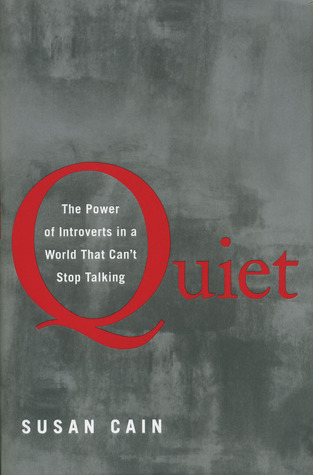
Question: How do you know if someone is an introvert?
Answer: They're going to fucking tell you.
Right now, it's very popular to be an introvert. There are various introvert webcomics, TED talks about why introversion is so great, and numerous people who will tell you that they are an introvert and subject you to discussion and analysis of what this means with the same enthusiasm of someone who reads horoscopes. People confess to introversion with the same kind of humble bragginess as self-obsessed artists who roll their eyes when you compliment their art and say it was "just a sketch."
It's true that being quiet or shy (note: these are not the same thing) used to be considered a bad thing. I grew up at the height of "party culture," when all things club or frat were popular. Jersey Shore was on TV, skirts were short, hair was frosted, and everything was superficial and light. If you couldn't fizz and glitter like a sparkler in everyday conversation, you were weird and everyone hated you. I was weird, and people were not fans of me. I wore all black, read Anne Rice, and listened to Evanescence and The Cure while pondering why all of my classmates were idiots. My scorn probably didn't help, but there was absolutely no way at the time I could have fit it, or been happy doing so.
Skimming through the reviews, I noticed I was one of the few self-professed introverts who despised this book. I thought that was interesting, but it's not completely unforeseen. I actually self-describe as a "social introvert" or "false extrovert." People who meet me for the first time think I'm very extroverted. I can be very loud and chatty, and organize a lot of social events in my office or with friends. But I'm also very uncomfortable in certain social situations and as much as I enjoy being out, I'm sometimes secretly delighted when plans are canceled and enjoy spending time by myself.
It's been a while since my psychology days, but there is a chemical basis for introversion and extroversion. One of these lies in the sympathetic/parasympathetic nervous systems. People who are introverted have a lower threshold for being overstimulated, and when they reach that threshold, feel drained and must rest. People who are extroverted, on the other hand, have a lower threshold and need to seek out stimulation in order to get the bar up. If they don't get stimulation, they feel sluggish and depressed. I thought the neurotransmitter in question was dopamine, but a quick Google makes it look like the neurotransmitter in question is actually acetylcholine. #TIL
I have taken issue with a lot of these pop psychology books. I wasn't a fan of THE SBUTLE ART OF NOT GIVING A F*CK, which seemed like the self-help version of snake oil, and recently also read SNAKES IN SUITS, which was like a Lifetime movie wearing science like it was a pretty dress. This one had a bit more science, but Susan Cain definitely spent way too much time cherry picking her arguments and the end result was me having a bad taste in my mouth and wanting to roll my eyes.
I guess I have a few take-away points here.
1. Introverts and extroverts serve different functions in society. Neither is an intrinsically good or bad trait, and they are not binary. Like many human characteristics, these exist on a spectrum.
2. We live in a social society, and acting antisocial to coddle your introversion makes you look, well, antisocial (confrontational, against society) instead of asocial, which is just wanting to be left alone.
3. It's probably true that a lot of introverts were responsible for inventions because they spent a lot of time alone, but this is not the only type of genius or the only form genius takes. As I said in point #1, humans exist on a spectrum, and there are many different shapes of brilliant minds out there.
4. People enjoy belonging to groups. That's why horoscopes are so popular, and why people post their Meyers-Briggs results on their dating websites. We live in an in-group vs. outgroup society - yes, you too, introverts, jeez - and enjoy feeling as though we belong. Introverts like calling themselves introverts because it makes them feel a bond with other introverts (seriously, just read the comments sections of any of the positive reviews for this book), which promotes bursts of probably dopamine.
5. The author seems to be claiming that extroverts have the natural advantage and are mean to introverts but then spends a big part of the book shitting all over them. Hypocrite.
At the end of the day, you should take books like these with a grain of salt. They're definitely more self-help geared than scientific, in my opinion,and a lot of the arguments and conclusions feel cherry-picked. Introverts may enjoy reading it while vigorously patting themselves on the back, but we as a society are moving in a direction where this is starting to feel kind of redundant and narcissistic.
1 out of 5 stars
